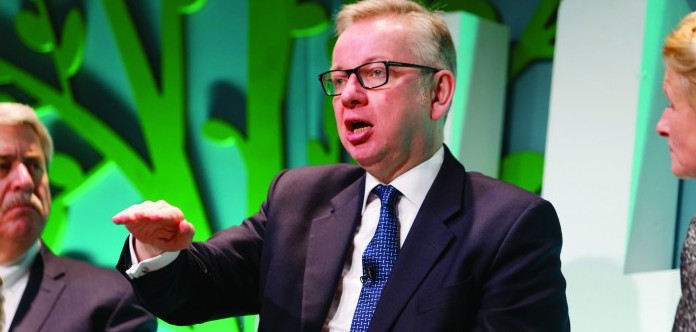“One thing frustrates me about the Defra canteen…” Michael Gove began, in the midst of an answer about public procurement in front of a packed press room.
Then his political antennae kicked in. “… perhaps that is a discussion for another day,” he added after a pause, apparently denying us eager journos a scoop on his own Department’s failure to puts it money where its mouth is.
Danish bacon? Thai chicken? Irish beef? GM Brazilian soya milk? Perhaps we’ll never know what’ was bugging Mr Gove.
Even so, the Defra Secretary’s admission at the NFU conference, echoing similar comments at Oxford in January, that the Government is still not doing enough to champion British food in its procurement policies highlights the tensions that lie ahead over the Government’s animal welfare agenda.
On the one hand, Mr Gove is making a big play of the steps this Government is taking to address animal welfare on farms, not to mention in homes and circuses and in seas and countries beyond our shores.
The latest intervention was the belated confirmation that animal health and welfare on farms will, after all, be classified as a ‘public good’ worthy of public support. There could be incentives for pioneering new technologies and methods, grants for straw-based pig buildings, reward for joining RSPCA Assured and even for presenting pigs at abattoirs with intact, healthy tails.
There could undoubtedly be some real gains there. But on the latter point, Defra appears to have moved only half way towards basing animal welfare payments on outcomes, rather than systems, as surely it should. However, if this initiative has legs (as well as tails), the industry will need clarification that tails on pigs from all systems qualify. There is no reason why some pigs’ tails should be more equal than others.
The danger, of course, is that if you start driving farmers towards higher welfare, higher cost systems, you can start messing with the market. The pig sector knows this well. There can only be a limited premium for ‘high welfare’ meat. Much of the supply chain will continue to be price-driven.
Meanwhile, in another part of Government, plans are being hatched to establish new trade deals with the likes of low cost and, in some cases, lower standards-pork producer, the US. However, much Defra Ministers insist they will not allow our standards to be compromised, the reality is that there are two distinct sides to this argument within Government. And one sees cheap food as the goal and doesn’t see different standards as a barrier. Only one side can prevail.
It might be our side and George Eustice might well be right that Parliament wouldn’t allow a deal that compromises our own high standards. But, then again, if the Government and even Defra’s own canteen aren’t overly concerned about buying British, how can we possibly have any faith that, when push comes to shove, things will be any different after we leave the EU?




